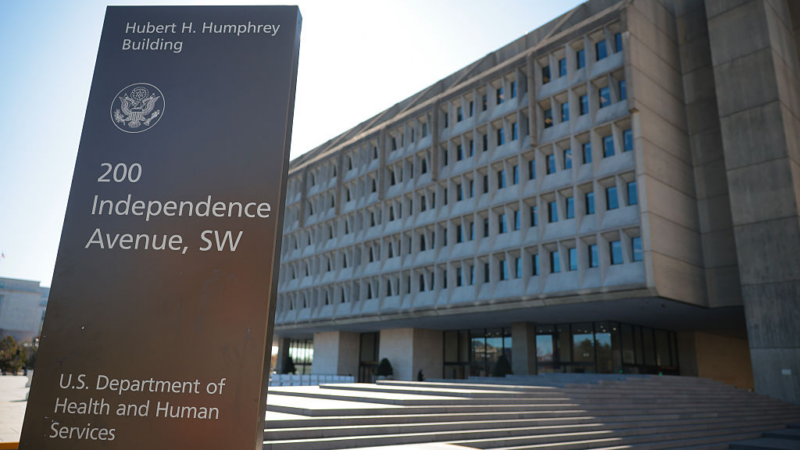Widespread firings start at federal health agencies including many in leadership
The Trump administration began sending notices of termination to thousands of staffers at federal health agencies Tuesday, according to interviews with employees and officials at multiple agencies and e-mails reviewed by NPR.
The Department of Health and Human Services last week announced it planned to dismiss 10,000 people. These cuts come on top of around 10,000 people already leaving the agencies under the Trump administration’s Fork in the Road offer and early retirement.
Termination emails went out Tuesday morning to employees and leadership of agencies within HHS, the Food and Drug Administration, the National Institutes of Health, the Centers for Disease Control and Prevention as well as several smaller agencies.
On Thursday, HHS Secretary Robert F. Kennedy Jr. said in a statement that the layoffs were intended to reduce “bureaucratic sprawl.” “We are realigning the organization with its core mission and our new priorities in reversing the chronic disease epidemic,” he said.
But agency staff and leaders in the field say the cuts are a blow to public health, medicine and biomedical research in the U.S.
“We’ve never seen anything like this before,” Dr. Ashish Jha, the dean of the Brown University School of Public Health, who served as President Biden’s COVID-19 Response Coordinator, told NPR in an interview.
“We rely on our CDC for things like tracking down disease outbreaks. We rely on NIH for research into new treatments and tests and vaccines. At this moment, whether those will continue to be effective has really been put into question. We don’t know what the implications of all of this will be. I’m worried that what we’re going to see is more people getting sick, more disease outbreaks and infrastructure that is going to be less and less capable of responding to those threats.”
HHS, FDA and NIH did not immediately respond to NPR’s request for comment.
FDA sees major changes
At the FDA, the entire team that handles communications for the agency lost their jobs, according to staffers who were among those fired. They spoke on condition of anonymity for fear of retaliation for publicly criticizing the administration. According to an HHS fact sheet, 3,500 FDA jobs are being eliminated. The FDA’s top vaccine regulator, Dr. Peter Marks, revealed on Friday that he’s been forced out.
At the FDA’s Center for Drug Evaluation and Research, more than 800 people lost their jobs, according to an official who was laid off and fears retribution for sharing information. This part of the agency is responsible for new drug approvals as well as monitoring unexpected side effects after approval and making label changes.
Former FDA leaders who served under presidents from both parties took to social media to voice their concerns about the cuts.
“The FDA as we’ve known it is finished,” Dr. Robert Califf, who served as FDA commissioner twice, and stepped down in January, wrote on LinkedIn. He explained that he was “overwhelmed” with messages about the staff cuts and that the agency’s leaders who know the most about product development and safety had been let go.
“I believe that history will see this [as] a huge mistake,” he wrote. “I will be glad if I’m proven wrong, but even then there is no good reason to treat people this way. It will be interesting to hear from the new leadership how they plan to put ‘Humpty Dumpty’ back together again.”
Dr. Scott Gottlieb, who served as FDA commissioner during Trump’s first term from May 2017 through April 2019, wrote on X Tuesday that he fears the United States will no longer be the first to get access to new drugs and treatments as a result of the FDA staff cuts.
NIH leaders get reassigned
Hundreds of staffers at the National Institutes of Health have received notices. About 1,200 jobs were expected to be cut at the agency. Many of the NIH cuts appear to involve communications, IT and other support staff. But at least several high-ranking NIH officials also appear to be on their way out.
Dr. Jeanne Marrazzo, who took over as the director of the National Institute of Allergy and Infectious Diseases after Dr. Anthony Fauci departed, was offered reassignment to the Indian Health Service elsewhere in the country, according to an e-mail shared with NPR.
Several other leaders received the same offer including Renate Myles, director of communication for NIH, Dr. Eliseo J. Pérez-Stable, director of the National Institute on Minority Health and Health Disparities, Dr. Shannon Zenk, director of the National Institute of Nursing Research, and Dr. Diana Bianchi, the director of the Eunice Kennedy Shriver National Institute of Child Health and Human Development, according to several NIH employees who were not authorized to speak publicly.
“Despair, I think, is the only fitting word,” said one NIH employee describing the mood at the agency Tuesday. The person, who was not fired, asked not to be identified because of fear of losing her job.
The cuts prompted widespread condemnation outside the agency.
“The level of cuts at NIH I am hearing about today is truly mind-boggling,” wrote Jeremy Berg of the University of Pittsburgh, who served as the director of the National Institute of General Medical Sciences, part of the National Institutes of Health, from 2003 to 2011, wrote NPR. ” I try not to be hyperbolic but this seems to be a massacre. … I honestly don’t know where this leads.”
Some members of Congress have raised alarm about the cuts at HHS.
“The Trump Administration has launched an unprecedented attack on the federal health workforce,” said House Energy and Commerce Committee Ranking Member Frank Pallone, Jr., D-NJ, during remarks he made Tuesday at an oversight and investigations hearing on technology and cybersecurity related to medical devices.
“[Sec.] Kennedy claims that health care services will not be harmed by the dramatic downsizing, but he is wrong, and everyone who is paying any attention knows it,” he said.
Dozens presumed dead in fire at Swiss Alps bar during New Year’s celebration
Dozens of people are presumed dead and about 100 injured, most of them seriously, following a fire at a Swiss Alps bar during a New Year's celebration, police said Thursday.
Warren Buffett officially retires as Berkshire Hathway’s CEO
The legendary 95-year-old investor spent decades building his company into one of the world's largest and most powerful. Now Greg Abel is taking it over.
Crypto soared in 2025 — and then crashed. Now what?
For most of 2025, cryptocurrencies such as bitcoin surged as President Trump vowed to make the U.S. a crypto leader. But now, a severe sell-off has shaken the sector.
Zohran Mamdani sworn in as New York City mayor, capping historic rise
Mayor Zohran Mamdani took the oath of office in New York City after midnight Thursday. The city's first Muslim mayor, a member of the Democratic Socialists of America, has promised to focus on affordability and fairness.
Rising from the ashes, a symbol of hope at the Rose Parade
Survivors of the Eaton and Palisades Fires find healing and community working on a Rose Parade float to honor the lives and communities lost in last year's wildfires.
The history behind the NYC subway station chosen for Mamdani’s swearing-in
The city shut down the station in 1945 on New Year's Eve. Eighty years later, it's a symbolic venue choice for the incoming mayor's private swearing-in ceremony.







